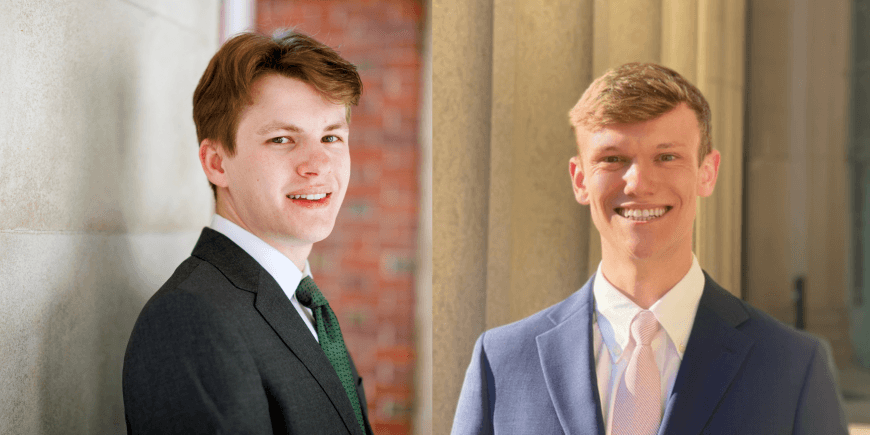Alexander Dyer, A.B. '24 (Stephanie Mitchell/Harvard University) and Richard Allen, A.B. '22
Two students pursuing concentrations or secondaries at the Harvard John A. Paulson School of Engineering and Applied Sciences were among six Harvard College students or recent graduates named to the Marshall Class of 2024. Alexander Dyer and Richard Allen are among 49 other Scholars nationwide that will head to the U.K. next year for two years of graduate studies at the college or university of their choice.
Dyer, A.B. ‘24, is concentrating in electrical engineering with a secondary in chemistry and is also studying for a concurrent master’s in electrical engineering. Originally from Tampa, Florida, he has focused on clinical neuroscience and worked to expand medical education surrounding vestibular dysfunction and cochlear-implant surgery. Dyer said he became motivated to study and improve biomedical devices in part because his father, a military veteran, suffered hearing loss and other impairments.
“I’m very interested in the ability of medical devices to learn from people and to be designed around them,” Dyer said. He also wants to improve access to prostheses in low-resource settings.
Next year, Dyer plans to pursue an M.Phil. in health, medicine, and society at the University of Cambridge, with emphasis on investigating how disability interacts with people who are experiencing homelessness.
Allen, A.B. ‘22, concentrated in physics and mathematics, with a secondary in computer science at SEAS, and is currently pursuing a Ph.D. in theoretical physics at MIT while serving as a resident tutor in Cabot House. A native of Clarksville, Virginia, Allen plans to pursue a master’s degree in theoretical computer science at the University of Oxford before returning to his Ph.D. program.
“As someone from a very small town, who at many times in their academic career has felt out of place at institutions of higher learning, I think [winning the Marshall] is a very powerful thing,” Allen said. “It’s a tremendous privilege, and I hope I can use it to widen academic circles that often feel exclusive.”
Click here to read the full article in the Harvard Gazette.
